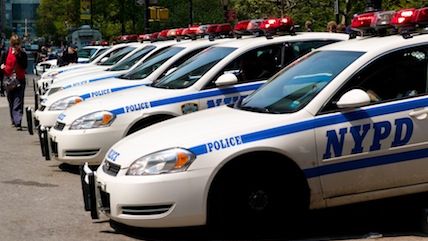Surveillance, Snitching, and Social Services
What were the actual effects of the NYPD's Juvenile Robbery Intervention Program?

Nearly a decade ago, the New York Police Department launched the Juvenile Robbery Intervention Program, also known by the unfortunate acronym J-RIP. This week an internal document detailing its failures came to light, leading to write-ups in The New York Times (under the headline "Report Finds Juvenile Program Failed to Reduce Robberies, but Police Are Expanding It") and the Gotham Gazette (under the headline "More Evidence Punitive NYPD Youth Programs Fail").
The most distressing detail may be this one, described by the Gazette:
Young people were…regularly visited by uniformed officers in their homes and on the streets. While these officers were supposed to be acting as mentors and monitors, defense lawyers reported that officers sometimes used these visits as a pretext to conduct searches and that they sometimes called attention to program relationships in front of other youth, potentially marking them as informants—a dangerous label in these neighborhoods.
"Mentors" who surveil you and give your friends the impression you're a snitch—no wonder the program didn't reduce crime. Nonetheless, the Gazette notes, "the NYPD has moved forward with an expansion of the program in a different guise," called NYC Ceasefire. The new effort

focuses more on gun crimes and adds group "call-in" meetings in which the targeted youth are brought in and lectured by police and community members about the harmful effects of their violent actions and the potential enhanced consequences of additional violent offenses. They are then placed under extensive surveillance regimes and targeted for enhanced punishments if caught re-offending. They are also offered some minimal services, primarily in the form of a centralized referral phone number run by a local non-profit that is there to link young people to already existing programs.
J-RIP and NYC Ceasefire are both examples of "Focused Deterrence" programs. Developed by criminologist David Kennedy, and first implemented in Boston in 1996, they attempt to stop gun violence or other serious crime through intensive and targeted enforcement combined with support services.
They are thus another example of the welfare state's convergence with the criminal justice system. For more on that marriage, go here and here; for further examples of it in action, go here and—from earlier this week—here.
Editor's Note: As of February 29, 2024, commenting privileges on reason.com posts are limited to Reason Plus subscribers. Past commenters are grandfathered in for a temporary period. Subscribe here to preserve your ability to comment. Your Reason Plus subscription also gives you an ad-free version of reason.com, along with full access to the digital edition and archives of Reason magazine. We request that comments be civil and on-topic. We do not moderate or assume any responsibility for comments, which are owned by the readers who post them. Comments do not represent the views of reason.com or Reason Foundation. We reserve the right to delete any comment and ban commenters for any reason at any time. Comments may only be edited within 5 minutes of posting. Report abuses.
Please to post comments


The actual effects were the same as always: increasing political power of the ruling class and enriching their friends.
Success!
Every public interaction initiative is a pretext for an illegal search.
C'mon, everyone knows that if a program isn't working it is because it isn't properly funded. Throwing more money at it is always the answer.
The way to get ahead in the NYPD is to use nuance and subtlety to build relationships, not to make as many arrests as possible, so I'm stunned this was a failure.
That cop was hugging Eric Garner! HUGGING him!
He was a tattooed midget wearing jean shorts who loved hugs.
I will never understand why people in certain neighborhoods don't trust the police. Must be all that anti-police rhetoric in the media.
There's a War on Cops, Hugh. Fortunately, our Heroes in Blue saw it coming, which is why they've had to launch all those preemptive strikes.
Why the surprise? In government, nothing succeeds like failure.